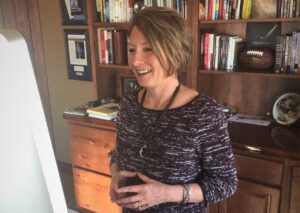
The First Work of Wise Leadership Influence in the AI Revolution (Prayer)
As I reflect on the new leadership development project I’m working on – Character Mandate: Winning Strategies for Building Timeless Virtues in Tomorrow’s AI Leader (Will we lead AI? Or, will it lead us?), I’ve also been reflecting on Prayer. Quotes like these challenge me:
- “God does nothing but in answer to prayer.” John Wesley
- “You can do more than pray after you have prayed, but you cannot do more than pray until you have prayed.” S.D. Gordon
I’ve been bringing various ideas to ChatGPT. This is Chat’s summary of some of the concepts I’ve been brainstorming with it. I trust you find these reflections strengthen you in your leadership walk.
Prayer: The First Work of Wise Leadership in the Age of AI
In a world teeming with more information than at any time in history, leaders today face a profound challenge: How do we lead with clarity when complexity abounds? How do we cultivate Wisdom, Insight, Knowledge, and Discernment—what I call W.I.N.D.—to ensure we lead AI, rather than allow AI to lead us?
One answer, on ancient practice, stands humbly yet powerfully before us: prayer.
Not merely a spiritual discipline reserved for sacred spaces, prayer is an essential leadership practice. This quiet force shapes resilient character, cultivates courageous vision, and establishes an unshakable connection with divine wisdom.
Oswald Chambers reminds us, “Prayer does not equip us for greater works—prayer is the greater work.” This jolting truth reminds us that prayer isn’t peripheral to leadership; it is central. It’s not the last resort when reason runs dry; it’s the first line of defense for soul-guided, truth-aligned action.
The Leadership Crisis: Data Without Discernment
We live in an AI-driven age. Algorithms can write code, synthesize strategies, and even generate answers to complex queries. But AI—no matter how advanced—cannot replace the wisdom that flows from prayerful leaders grounded in timeless values.
Today’s crisis isn’t access to knowledge. It’s the scarcity of discernment. Leaders don’t just need to know what’s happening—they need to know what matters most. Without moral clarity, insight is aimless. Without inner conviction, innovation becomes manipulation.
This is why we must train tomorrow’s AI leaders in the habits of the heart, starting with prayer. It is not an escape from the world’s complexity. It is our clearest compass through it.
Three Ancient Practices: Jesus’ Prayer Life as a Leadership Model
Pastor Tom Foisy recently explored how Jesus, though fully divine, practiced a deeply rooted lifestyle of prayer. His model draws from three foundational forms of Jewish prayer—practices that reveal a pattern for how wise leaders can pray without ceasing (1 Thessalonians 5:17), even amid full calendars and crowded minds.
Shema: Prayer That Grounds Identity
“Hear, O Israel: The Lord is our God, the Lord is one.” — Deut. 6:4
The Shema is the heartbeat of Jewish faith. Recited daily, morning and evening, it declares who God is and who we are in relation to Him. It orients the heart to love God “with all your heart, soul, and strength.”
For leaders, this prayer anchors us in identity. Before tasks, roles, and technologies, we are first and foremost people created in God’s image, called to love and serve. When Jesus likely began and ended His days with the Shema, He wasn’t just repeating doctrine—He was re-aligning His life with the Father’s voice.
- Leadership Takeaway: Begin your day with a Shema-like ritual. Remind yourself who you are—not by your performance or productivity, but by your belonging to a good and wise Creator. This prevents drift into ego, fear, or performance-based identity.
Amidah: Prayer That Shapes Decisions
The Amidah is a series of 19 blessings recited three times a day, including requests for wisdom, healing, justice, and peace. It contains deep longings—for personal transformation, community redemption, and world renewal.
Jesus, raised in Jewish tradition, likely participated in this rhythm. Even in His solitary prayers, you hear echoes of these themes: “Not My will but Yours be done,” “Give us this day our daily bread,” “Forgive us our trespasses.”
- Leadership Takeaway: Wise decisions aren’t merely strategic—they are spiritually attuned. When leaders embed themselves in patterns of intercession and humility, they resist the pull of pride or fear-based decisions. Praying the modern equivalent of the Amidah can help leaders pause, reflect, and ask: “Am I aligned with what is good, true, and just?”
Berakhot: Prayer That Infuses the Ordinary
The Berakhot, or blessings, sanctify everyday moments. From the mundane (eating bread) to the majestic (witnessing lightning), these brief prayers affirm God’s presence in all of life.
Jesus turned water into wine at a wedding, broke bread with outcasts, and taught us to pray for “daily bread.” His life demonstrated that no task is too small for divine engagement.
- Leadership Takeaway: Prayer isn’t confined to devotions. It flows through boardrooms, coffee meetings, email replies, and budget reviews. A leader who blesses the ordinary invites God’s presence into every layer of influence. This is how we pray without ceasing—not by closing our eyes all day, but by opening our awareness all day long.
Prayer as a Pathway to W.I.N.D.
Let’s revisit the acronym: Wisdom, Insight, Knowledge, Discernment. These are the virtues AI can mimic but never master. They are cultivated through communion with a wisdom greater than our own.
-
Wisdom is not just knowing what is true—it is knowing how to live it.
-
Insight is the ability to see below the surface.
-
Knowledge is less about accumulation and more about integration.
-
Discernment is the art of decision-making in morally complex terrain.
Prayer is the soil where W.I.N.D. grows. It slows us down so we can hear the still, small voice. It interrupts the tyranny of urgency. It stretches our imagination beyond the visible. It sensitizes us to the Spirit’s nudge when logic alone doesn’t suffice.
In the age of AI, where synthetic intelligence is quick but shallow, we need soul-deep leaders who pray more than they post, who pause before they publish, and who reflect before they react.
Three Foundations of Inner Strength: Prayer’s Role in Shaping Character
In Character Matters, I write about building timeless values in tomorrow’s AI leaders. One of the greatest character builders is consistent, courageous prayer.
-
Prayer strengthens character because it requires humility: acknowledging our limitations.
-
Prayer deepens courage because it aligns us with a greater power than our fear.
-
Prayer builds connection because it teaches us to listen—first to God, then to others.
When leaders make prayer central—not just ceremonial—they begin to embody the kind of virtues that cannot be programmed into a machine. They begin to lead with integrity, not just efficiency.
Three Modern Practices: What It Really Means to Pray Without Ceasing
1 Thessalonians 5:17 says, “Pray without ceasing.” At first glance, it feels impossible. How can I possibly pray all day when I have a mile-long to-do list?
But as I’ve studied and reflected, I’ve come to see this call not as a burden but as a beautiful invitation.
A Spirit of Dependence:
Praying without ceasing means living in a posture of ongoing trust. Even when I’m not speaking to God, I’m leaning on Him. I’m aware that I can’t do this alone, and I don’t have to.
A Lifestyle of Attentiveness:
It’s not about words; it’s about presence. It’s knowing that God is in the room—when I’m crafting a vision, resolving conflict, or resting with my family. Every moment becomes an opportunity for awareness.
Throughout the day, I return. In the car. Between meetings. While making dinner. Prayer becomes a gentle thread that weaves through every hour, anchoring me in who I am and whose I am.
Conclusion: Leading from the Secret Place
If we want to build timeless values in tomorrow’s leaders—values that can withstand the pressure of a digitized, globalized, AI-accelerated world—then we must train them to lead from the secret place. Not the platform. Not the podium. But the quiet, holy ground of prayer.
Oswald Chambers reminds us: “When a man is at his wits’ end, it is not a cowardly thing to pray; it is the only way to get in touch with Reality.”
Let us not wait for our wits’ end. Let us build leaders who start with prayer—who live in prayer—who lead from prayer.
In doing so, we won’t just manage complexity. We will flourish with wisdom.
Copyright, Danita Bye (This article includes ChatGPT-generated input. 😊
Let’s discuss a tailor-made interview to meet your audience’s needs.
Virtual speaking event? No problem!
Check out my Speaker page HERE.
To schedule a call, contact me at danita@danitabye.com




No Comments